Related Research Articles

Martin Luther King Jr. was an American Baptist minister and activist, one of the most prominent leaders in the civil rights movement from 1955 until his assassination in 1968. An African-American church leader and a son of early civil rights activist and minister Martin Luther King Sr., King advanced civil rights for people of color in the United States through nonviolence and civil disobedience. Inspired by his Christian beliefs and the nonviolent activism of Mahatma Gandhi, he led targeted, nonviolent resistance against Jim Crow laws and other forms of discrimination.

Coretta Scott King was an American author, activist, and civil rights leader who was married to Martin Luther King Jr. from 1953 until his assassination. As an advocate for African-American equality, she was a leader for the civil rights movement in the 1960s. King was also a singer who often incorporated music into her civil rights work. King met her husband while attending graduate school in Boston. They both became increasingly active in the American civil rights movement.

Dexter Scott King is an American civil rights activist and the second son of civil rights leaders Martin Luther King Jr. and Coretta Scott King. King is also the brother of Martin Luther King III, Bernice King, and Yolanda King.

Martin Luther King Sr. was an African-American Baptist pastor, missionary, and an early figure in the Civil Rights Movement. He was the father and namesake of the civil rights leader Martin Luther King Jr.

Alberta Christine Williams King was Martin Luther King Jr.'s mother, married to Martin Luther King Sr. She played a significant role in the affairs of the Ebenezer Baptist Church. She was shot and killed in the church by 23-year-old Black Hebrew Israelite Marcus Wayne Chenault six years after the assassination of Martin Luther King Jr.
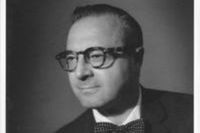
Stanley David Levison was an American businessman and lawyer who became a lifelong activist in progressive causes. He is best known as an advisor to and close friend of Martin Luther King Jr., for whom he helped write speeches, raise funds, and organize events.

Yolanda Denise King was an African-American activist, actress and first-born child of civil rights leaders Martin Luther King Jr. and Coretta Scott King who pursued artistic and entertainment endeavors and public speaking. Her childhood experience was greatly influenced by her father's highly public activism.
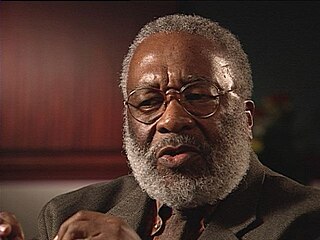
Vincent Gordon Harding was an African-American pastor, historian, and scholar of various topics with a focus on American religion and society. A social activist, he was perhaps best known for his work with and writings about Martin Luther King Jr., whom Harding knew personally. Besides having authored numerous books such as There Is A River, Hope and History, and Martin Luther King: The Inconvenient Hero, he served as co-chairperson of the social unity group Veterans of Hope Project and as Professor of Religion and Social Transformation at Iliff School of Theology in Denver, Colorado. When Harding died on May 19, 2014, his daughter, Rachel Elizabeth Harding, publicly eulogized him on the Veterans of Hope Project website.

Clayborne Carson is an American academic who is a professor of history at Stanford University and director of the Martin Luther King, Jr., Research and Education Institute. Since 1985, he has directed the Martin Luther King Papers Project, a long-term project to edit and publish the papers of Martin Luther King Jr.

The Martin Luther King Jr. Center for Nonviolent Social Change, commonly known as The King Center, is a nongovernmental, not-for-profit organization in Atlanta, United States.
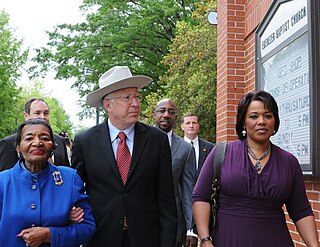
Willie Christine King Farris is the eldest sibling of Martin Luther King Jr. She taught at Spelman College and is the author of several books and was a public speaker on various topics, including the King family, multicultural education, and teaching.
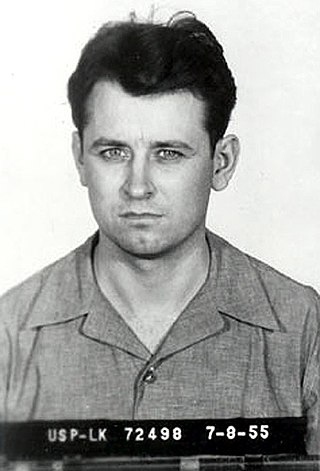
James Earl Ray was an American fugitive convicted for assassinating Martin Luther King Jr. at the Lorraine Motel in Memphis, Tennessee, on April 4, 1968. After this, Ray was on the run and was captured in the UK. Ray was convicted in 1969 after entering a guilty plea—thus forgoing a jury trial and the possibility of a death sentence—and was sentenced to 99 years of imprisonment.

Martin Luther King Jr., an African-American clergyman and civil rights leader, was fatally shot at the Lorraine Motel in Memphis, Tennessee, on April 4, 1968, at 6:01 p.m. CST. He was rushed to St. Joseph's Hospital, where he died at 7:05 p.m. He was a prominent leader of the civil rights movement and a Nobel Peace Prize laureate who was known for his use of nonviolence and civil disobedience.
The Mountaintop is a play by American playwright Katori Hall. It is a fictional depiction of Martin Luther King Jr.'s last night on earth set entirely in Room 306 of the Lorraine Motel on the eve of his assassination in 1968.
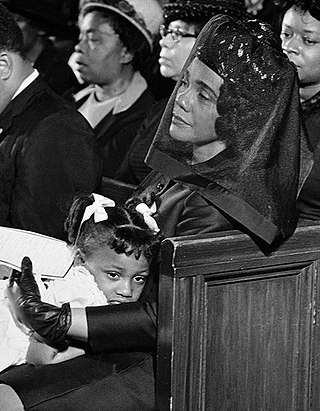
The first memorial service following the assassination of Martin Luther King Jr. on April 4, 1968, took place the following day at the R.S. Lewis Funeral Home in Memphis, Tennessee. This was followed by two funeral services on April 9, 1968, in Atlanta, Georgia, the first held for family and close friends at Ebenezer Baptist Church, where King and his father had both served as senior pastors, followed by a three-mile procession to Morehouse College, King's alma mater, for a public service.
The history of the 1954 to 1968 American civil rights movement has been depicted and documented in film, song, theater, television, and the visual arts. These presentations add to and maintain cultural awareness and understanding of the goals, tactics, and accomplishments of the people who organized and participated in this nonviolent movement.

Evelyn La Rue Pittman was an author, composer, choral director, producer, and music educator.

Conspiracy theories about the assassination of Martin Luther King Jr., a prominent leader of the civil rights movement, relate to different accounts of the incident that took place on April 4, 1968, in Memphis, Tennessee. King was assassinated on the balcony of the Lorraine Motel, the day after giving his final speech "I've Been to the Mountaintop". Claims soon arose over suspect aspects of King's assassination and the controversial role of the alleged assassin, James Earl Ray. Although his guilty plea eliminated the possibility of a trial before a jury, within days, Ray had recanted and claimed his confession was forced. Suspicions were further raised by the confirmation of illegal surveillance of King by the FBI and the CIA.
The Loyd Jowers Trial was an American civil suit brought by the family of Martin Luther King Jr. against Loyd Jowers, following his claims of a conspiracy in the assassination of the civil rights leader in 1968. The jury would eventually decide in 1999 that there was a conspiracy perpetrated by Jowers and other conspirators.
References
- ↑ Jessie Carney Smith, Joseph M. Palmisano Reference library of Black America -2000 - Volume 4 - Page 948 After the assassination of Dr. Martin Luther King Jr. in 1968, she wrote the opera Freedom Child in his ...
- ↑ The African American Almanac L. Mpho Mabunda - 1997 -- Page 889 0810378671 After the assassination of Martin Luther King, Jr. in 1968, she wrote the opera Freedom Child in his memory and honor; when she retired, she dedicated herself to directing a touring company of Freedom Child.
- ↑ Freedom Child, 2017-09-01, retrieved 2023-02-20